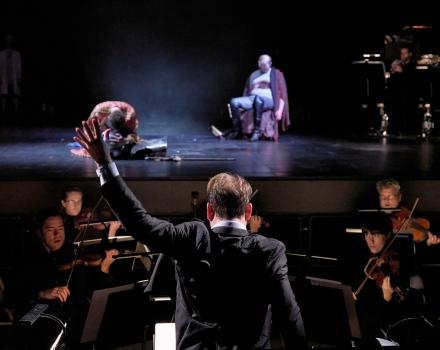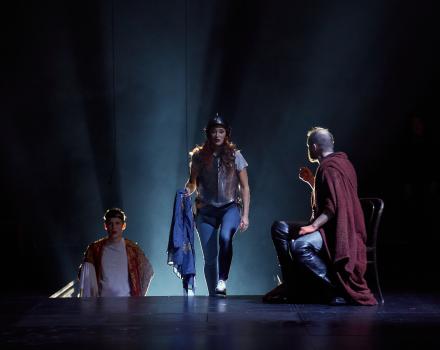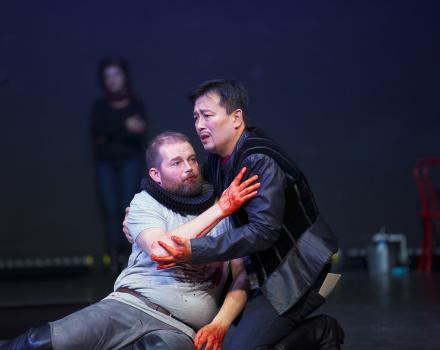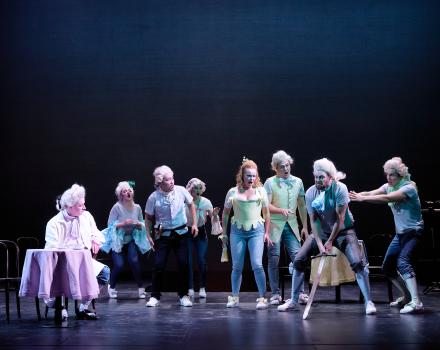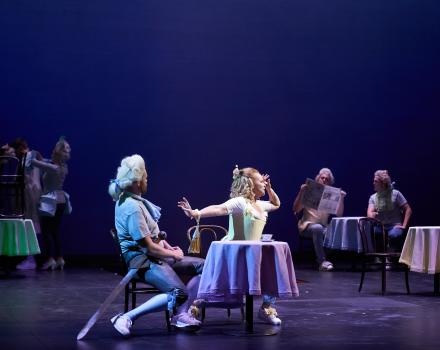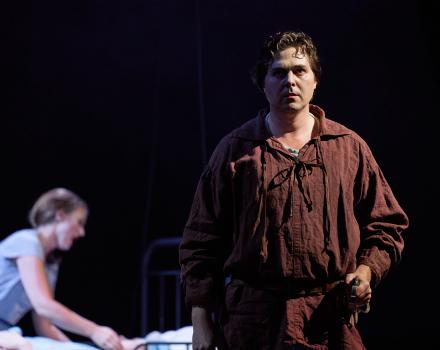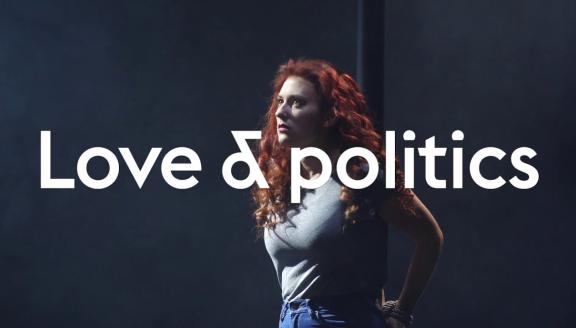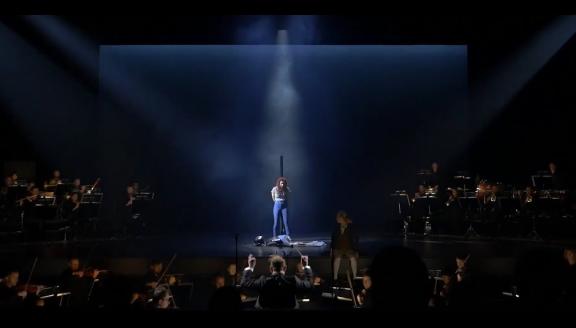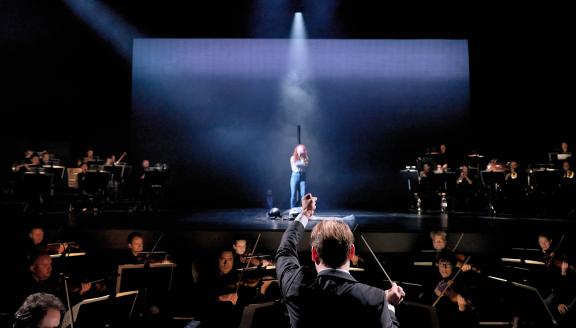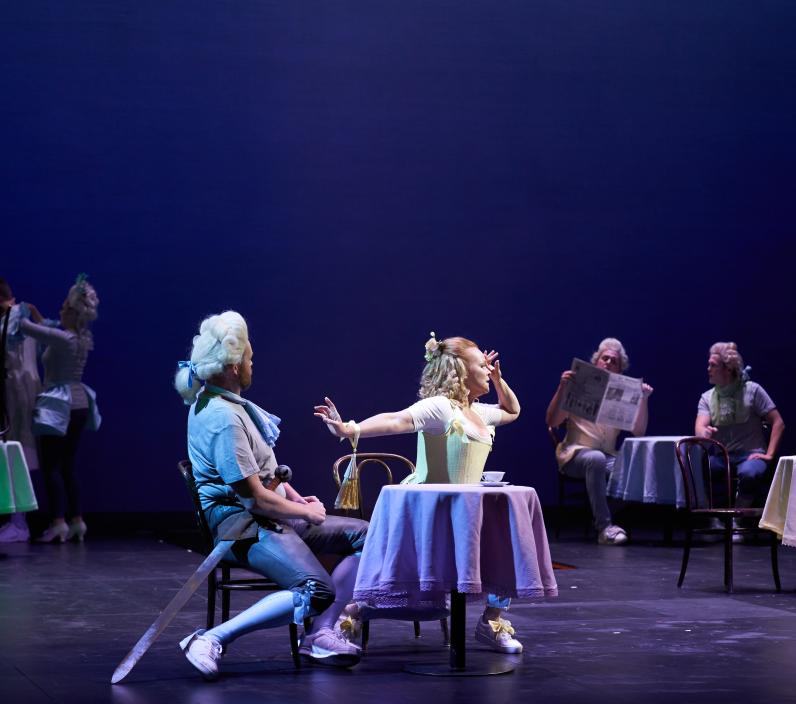

Love & Politics

When private love affairs become entangled in public political intrigue, the outcome is often tragic. The protagonists have no choice but to watch helplessly as they suddenly become a pawn in a game they thought they could control.
With Love & Politics, Dan Turdén embarks on his position as artistic director of Norrlandsoperan. The opera performance compellingly combines four Verdi operas based on Friedrich Schiller's plays - Don Carlo, I masnadieri, Luisa Miller and Giovanna d’Arco - into a reflection on the many faces of love caught up in political power games.
Cast
Singers | Hrolfur Saemundsson, Hege Gustava Tjønn, Susanna Levonen, Tapani Plathan, Elsa Ridderstedt, Jihan Shin, Linus Flogell, Fabian Düberg |
|---|---|
Actress | Sara Ribbenstedt |
Orchestra | Norrlandsoperans Symfoniorkester |
| ... | |
Music | Giuseppe Verdi |
|---|---|
Conductor | Ville Matvejeff |
Director | Dan Turdén |
Lighting | William Wenner |
Text | Temistocle Solera, Andrea Maffei, Salvatore Cammarano (Joseph Méry), Camille du Locle (Monolog based on text by Friedrich Schiller) |
Costumes and make-up designer | Angelica Ekeberg |
Assistant Director | Oskar Bergström |
Assistant Conductor | Simon Bång |
Répétiteurs | Jonas Olsson, Nigar Dadascheva |
Sound recording and mix | Johannes Oscarsson |
Concertmaster | Bartosz Cajler |
| ... | |
Video
The story
First scene
Giovanna d'Arco
1430s
Giovanna (Joan of Arc) has successfully led the French forces and won a battle against the English. Still, she has been taken captive by them.
She is tied to the stake, awaiting to be burned as a witch. During the night she has visions in which she leads the French to battlefield victory. She also sees king Charles VII being captured by the English and asks God why he punishes her, even though she has forsaken her worldly love for the King.
Giovanna's father Giacomo has believed all along that she has been possessed by the Devil, but when he hears her talk of her love for God he realises that he has been mistaken and frees her. Giovanna prepares to go to the front yet again.
Second scene
I masnadieri
1750s
During a break from his studies at the university, young Carlo has joined a band of ruthless highwaymen.
Having tired of his lawless life, Carlo writes to his father Massimiliano and begs for help and forgiveness. The letter is intercepted by his younger brother Francesco before reaching the receiver. Francesco envies his brother, and destroys the letter, and Massimiliano disowns Carlo.
When Carlo finds out about this, he decides to remain with his new comrades for the rest of his life and is elected their leader. After assaulting a city to rescue one of his new friends from prison and setting fire to half of the city, he questions his way of life and considers to end it.
Francesco takes the opportunity to feign a message that Carlo has died in a confrontation. In the presence of Massimiliano and Carlo's fiancée Amalia, Francesco reads Carlo's (feigned) last wish, in which Carlo bids farewell to his family and entreats Francesco to care for Amalia. Old and infirm, Massimiliano regrets being so hard on Carlo, and dies.
Francesco confesses his love for Amalia, who rejects his proposal. This enrages Francesco, but Amalia manages to trick him and escapes.
Third scene
Luisa Miller
1720s.
Middle-class Luisa is in love with the Count's son Rodolfo. Both their fathers, Herr Miller and Count Walter, strongly oppose their relationship. Furthermore, in a weak moment Miller has promised his daughter to Wurm, the Count's steward.
Realising that Luisa never will love Wurm, Miller gets cold feet and tries to wriggle out of his promise. Wurm has Miller arrested and uses Luisa's love for her father. In order to set him free, she has to write a letter, dictated to her by Wurm. In it, she confesses that she has never loved Rodolfo, that her sole ambition was to better herself, and that she really loves Wurm.
Miller tells Luisa that a grand wedding is being prepared in the castle. Suddenly Rodolfo appears and declares his love for Luisa. A moment later Walter enters, to collect his son who is supposed to marry someone of his own class. Walter calls Luisa a prostitute and a brawl ensues. When things are getting out of hand, Luisa gets down on her knees to try and calm both fathers down.
Fourth scene
Don Carlo
1560s
The marquis of Posa has come to see his best friend Don Carlo, prince and heir to the Spanish throne, who is in prison awaiting execution. Posa has concluded that the only way to achieve a political change in Flanders, a Spanish colony, is to make sure that the prince will not be executed.
The princess of Eboli is a close confidante of queen Elisabetta. The queen is a French princess and was supposed to be married to Don Carlo. Due to geopolitical strategies, though, she was married to his father, King Filippo II. Eboli has confessed to the queen that she has intrigued behind her back, and that she has been a mistress of her husband, King Filippo. Before Elisabetta leaves her, she delivers an ultimatum to Eboli: either enter a convent or go into exile.
Don Carlo has received a letter proposing a secret meeting with Elisabetta. The letter is actually written by Eboli, who is secretly in love with Carlo. She has misinterpreted his attentions to the queen, thinking he was in love with her. When all is revealed, Eboli is in the possession of a secret that may cost both Don Carlo and the queen their lives. Posa tries to interrupt their meeting. The two men watch Eboli leave, knowing that she will make use of her discovery. Posa knows that Carlo is in possession of secret documents that implicate the prince in recent uprisings in Flanders. As one of Spain's most prominent generals, Posa has tried with all his might to make the king stop the oppression of Flanders. Now he convinces Carlo to give him the documents.
Fifth scene
Giovanna d'Arco
1430s
Giovanna has once again led the French troops to victory, and they have won the war.
Mortally wounded, she is reunited with her father Giacomo and King Charles VII. After saying her last farewell, Giovanna joins the angels.
Insights
Giuseppe Verdi - larger than life
(1813-1901)
Giuseppe Verdi covered his letters with alternately exclamation marks and question marks. Small strings of !!!, !?? and ?!! as a finale to whatever he wanted to say - energetic, loud and galvanizing punctuation.
As a composer and man he was larger than life, and in the anecdotes he has angry outbursts during rehearsals. His fingers snap like castanets to push singers and musicians. Drops of sweat from his forehead smudge the scores, to the conductors' dismay.
But beyond the anecdotes there is gravity.
Verdi broke with the old ways of production and demanded that the performance should match the oeuvre. And the composer should have the last word, not the soloists or the manager.
During the latter part of the 19th century Verdi was the driving force of Italian opera and music, with a magnitude equal to Richard Wagner in the German parts of Europe.
There were earlier pinnacles in the form of Bellini, Donizetti and Rossini, but when Verdi entered the stage he is unrivalled.
He had a very long life - he was born during the Napoleonic wars, and he died in a modern era with telephones and radio. Steamships and railways brought Rigoletto, Il trovatore and La traviata to Kansas City, Sydney, Cape Town and Valparaíso. Barrel organs and accordions played his tunes on the streets of Glasgow and Gothenburg. He was an accomplished businessman who claimed copyright protection, and became the wealthiest composer of his time. His music was contemporaneous with the emergence of an independent and unified Italy - ‘liberty and Verdi’ became political synonyms for the opera audience, who cheered him with ‘Viva Verdi!’
At his funeral, a quarter of a million people joined the funeral procession. Arturo Toscanini conducted a huge orchestra, and the crowd sang ‘Va pensiero’ (‘Chorus of the Hebrew Slaves’) from Nabucco.
In the dramatic works of William Shakespeare and Friedrich Schiller, Verdi found a world that he wanted to transform to music. A world of emotion and contrast. Heroism and magnificence next to the simple life of man. Tragedy close to comedy. High and low. Shakespeare gave him Macbeth, Otello and Falstaff. From Schiller he got the four operas that are performed at Norrlandsoperan now. The Maid of Orleans turned into Giovanna d'Arco, which premiered at La Scala in Milan in 1845. The Robbers became I masnadieri (premiered in London 1847 with Jenny Lind). Intrigue and Love became Luisa Miller at Teatro San Carlo in Naples 1849. And Don Carlos premiered at the Paris Opera in 1867, then reworked as Don Carlo for La Scala in 1884.
Verdi's works have been an indisputable part of the international opera repertoire for a long time - like Un ballo in maschera and Aida. Verdi is still the great composer of choice for both singers and audience, together with Mozart and Wagner. But the latter two can't compete with Verdi when it comes to football, when the crowd is singing ‘La donna è mobile’ from the stands just before kick-off.
Gallery
